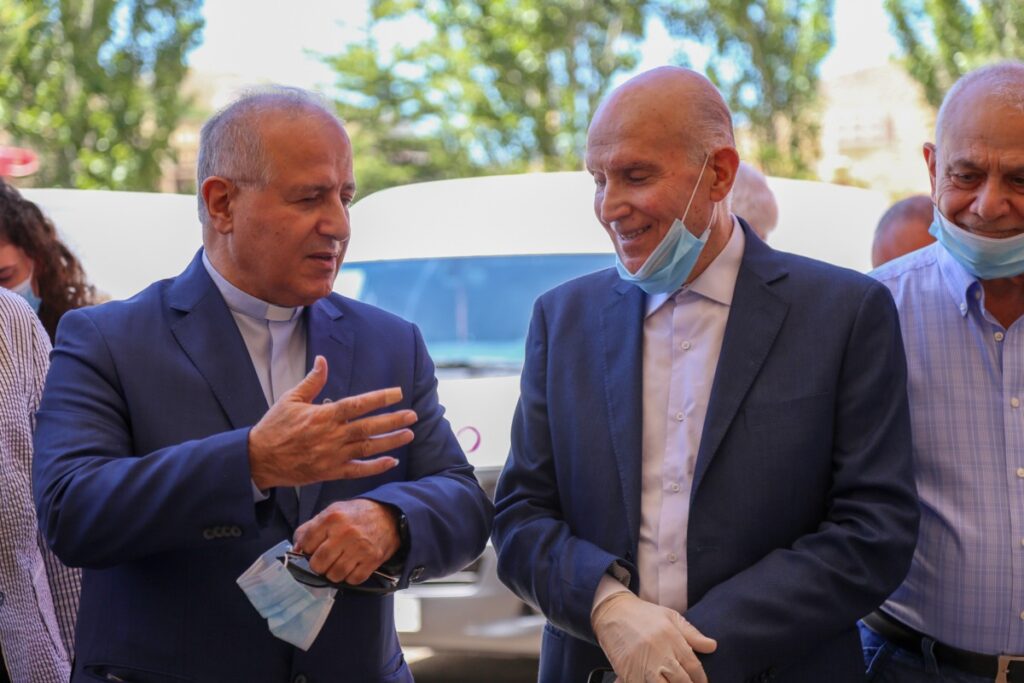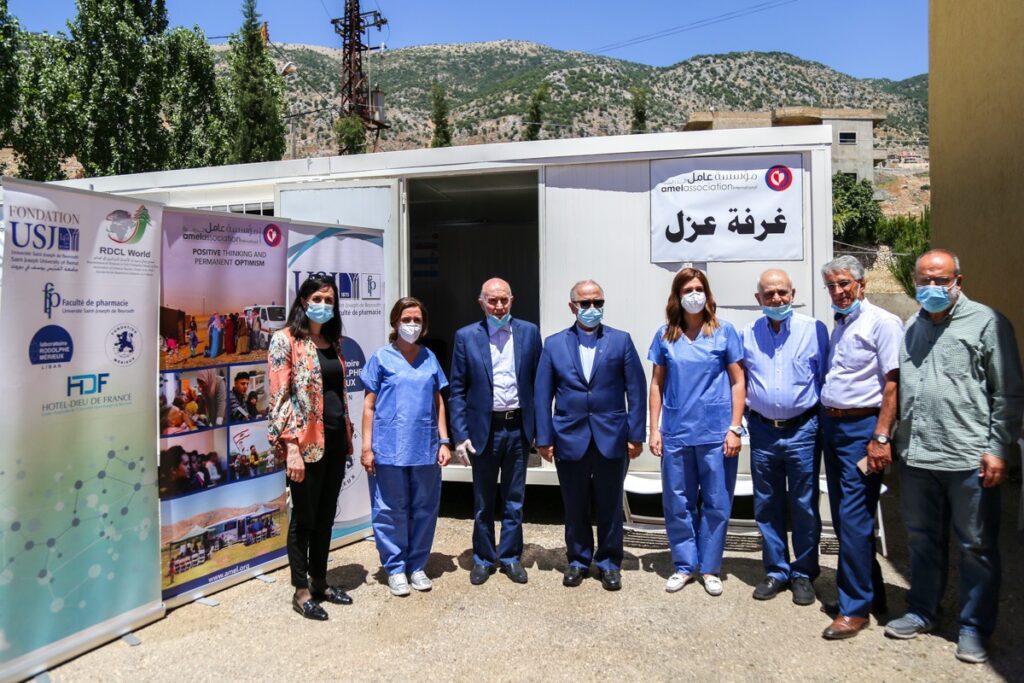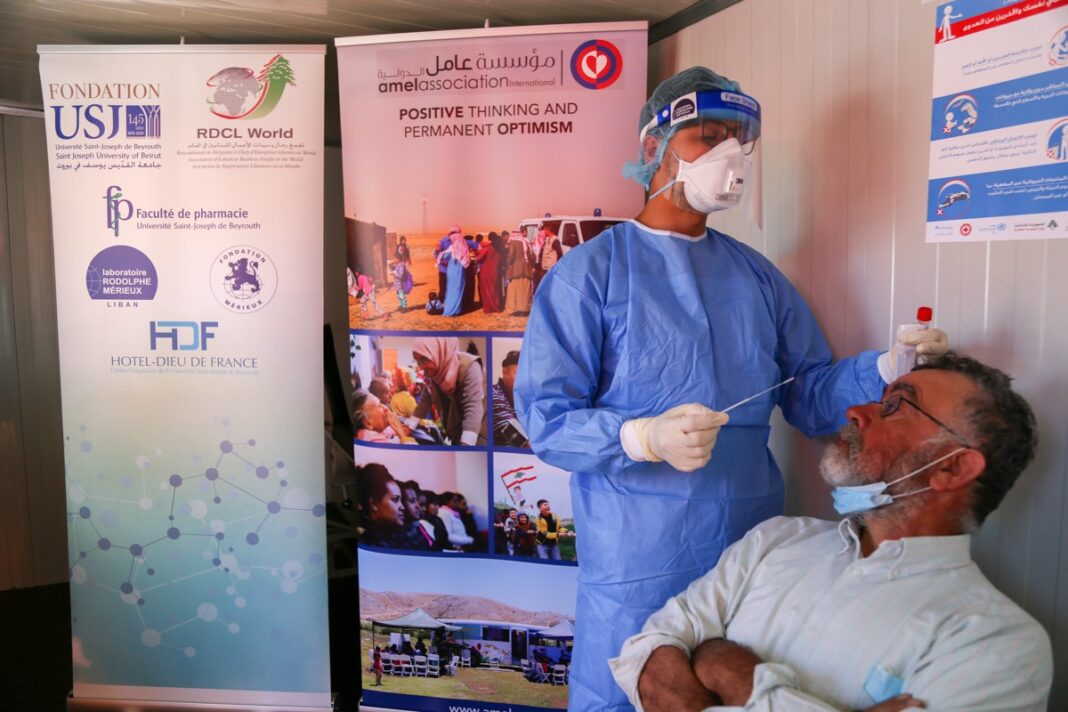Lebanon, having successfully overcome the first wave of the Coronavirus, is preparing to end official lockdown gradually and the return to normal life while adhering to preventive measures. But the situation remains risky and dangerous, given the current economic and health conditions, with more than 40% of people living in poverty including no access to basic health care and a number that has almost doubled in the last 4 months.
As a response, Amel and its partners are dedicating their efforts to ensure public safety and protection in the most vulnerable areas which are experiencing terrible challenges linked both to the Coronavirus and to the economic crisis. In order to examine the spread of the Coronavirus, rapid action was taken by Amel in collaboration with the Rodolphe Mérieux Laboratory of the Faculty of Pharmacy at St. Joseph University (USJ) in order to carry out PCR tests on local populations.

This PCR test campaign, which was launched in April, aims at collecting the largest number of representative samples in order to closely examine the situation, particularly for populations living in popular and rural areas where infection rates by the Coronavirus are still high.
This campaign has been extended in many marginalized areas, and this time was implemented in Amel’s Center for Health and Development “Mahdi Eidi center” in Mashghara to collect more random PCR tests. Professor Salim Daccache, Rector of the USJ, was present, in addition to the representative from the Fondation Mérieux Dr. Josette Najjar and the dean of the Faculty of Pharmacy at the USJ Dr. Marianne Abi Fadel and finally the mayor of Mashghara Mr. George Al Dibs and his deputy Mr. Abdallah Hadla were also present. They were welcomed by Dr. Kamel Mohanna, founding president of Amel, the administrative director of Amel Mr. Ahmed Abboud, Amel’s board member Dr. Zeina Mohanna, as well as the health teams of Amel.

The tests targeted people from the city of Machghara and surrounding Informal Tented Settelements (ITSs) in order to ensure public safety. These tests are part of Amel’s efforts to provide the right to health to everyone, as Amel has set up a call center under the supervision of the Ministry of Health and in cooperation with the UNHCR, and has conducted numerous PCR test sessions, in ITSs as well as in marginalized areas.
Dr. Mohanna delivered a speech where he welcomed Professor Salim Daccache and praised the role of USJ, its leadership in the fight against this pandemic at the national level and the cooperation with “Amel”, in particular in with regard to the most vulnerable members of society:
“We are concerned that this ordeal in Lebanon, which is suffering from a parallel economic and social crisis as serious as the Coronavirus pandemic, more than ever needs an effective plan of cooperation between the public, private and humanitarian, to avoid a social and economic disaster, ”said Dr. Mohanna.
Dr. Mohanna also stressed that Amel works internationally to allow those who are generally overlooked to be heard and that Amel will always be determined to fight for the dignity and rights of all.
In turn, Professor Daccache highlighted what brings Amel, St. Joseph University and Fondation Mérieux to work together during this crisis, which is the common message that supports human dignity and health:
“It is an honor for us today to cooperate with an association that works on the ground for all without any discrimination. Amel is a national message at the level of Lebanon.” He stated
He also considered that unbiased humanitarian work is a major challenge, but it is an opportunity, indicating that the university exploits all its capacities to support the Lebanese not only in terms of health but also in their economic situation. Additionally, Daccache praised the efforts of Rodolphe Mérieux’s laboratories, that carried out nearly 6,000 free examinations to date with the most vulnerable groups, and which continues to do so thanks to its partnership with Amel and with actors from the local community.
Dr. Josette Najjar in her turn, explained how Rodolphe Mérieux’s Laboratories is leading a global mission in the fight against the spread of the virus by reiterating “We are proud of our partnership with Amel and the interest of people in helping Lebanon to overcome the ordeal faced with economic and health crisis”.
The dean of the Faculty of Pharmacy at USJ, Dr. Marianne Abi Fadel, took part in the sample collection process, considering that the health teams in Lebanon and in the world are fighting a major battle and this shows their important in society.
Amel’s emergency response plan is implemented by more than 850 workers and volunteers, through its 25 centers, six mobile medical clinics, two mobile education units and a special protection mobile unit for street based children. Amel, with the support of its partners, will continue to implement its Coronavirus response plan.





 Creative Commons Attribution 4.0 International license
Creative Commons Attribution 4.0 International license